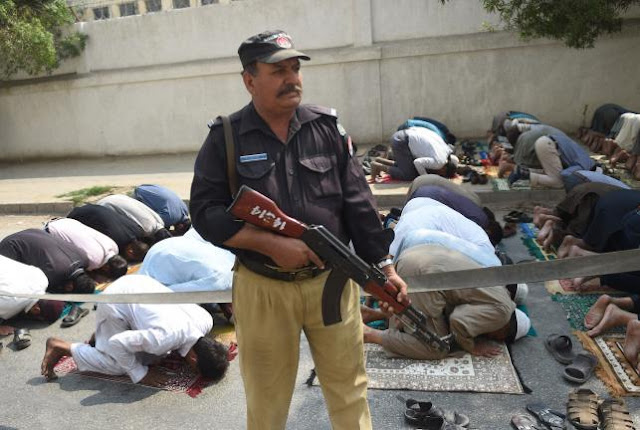Pakistani powers said Friday they had killed more than 100 "psychological militants" after 88 individuals kicked the bucket in an assault guaranteed by the Islamic State bunch on a Sufi sanctum which fed fears of a new surge in militancy.
The overwhelming impact came after a progression of wicked radical attacks this week, including an intense Taliban suicide bomb in the eastern city of Lahore which executed 13 individuals and injured handfuls.
Head administrator Nawaz Sharif and armed force head of staff General Qamar Javed Bajwa Friday went to the town of Sehwan in Sindh territory where the most recent assault occurred.
Sharif pledged to wipe out aggressors "with the full compel of the state".
Pakistan's military later said operations were in advance the nation over. "More than 100 psychological militants have been slaughtered since the previous evening", it stated, including others had been confined.
The rise of Islamic State gathering (IS) and a Taliban resurgence would be a noteworthy hit to Pakistan, and the assaults have scratched developing idealism over security following 10 years in length war on militancy.
Police Friday cordoned off the place of worship of Lal Shahbaz Qalandar, a thirteenth century Muslim holy person, in Sehwan, somewhere in the range of 200 kilometers (124 miles) upper east of money related center point Karachi.
The hundreds of years old place of worship's white floor was spread with blood, scattered with shoes, shawls, and child bottles.
At 3.30 am the holy place's overseer remained among the butchery and rebelliously rang its ringer, a day by day custom that he promised to keep, disclosing to AFP he will "not bow down to fear mongers".
Wellbeing authorities said the quantity of individuals executed in the altar impact had hopped to 88, including no less than 20 youngsters, making it the deadliest assault in Pakistan since a 2014 strike on a Peshawar school.
Islamabad has precluded the nearness from claiming IS, regardless of a few prominent assaults and the gathering's obvious alliance with homegrown aggressors, for example, the restricted Sunni partisan association Lashkar-e-Jhangvi (LeJ).
"I think they (IS) can do this" with assistance from homegrown gatherings, security master Amir Rana said of the sanctuary bombarding, as expert Imtiaz Gul cautioned the gathering would guarantee all the more such assaults.
Gul likewise cautioned there are "obvious signs" that groups of the umbrella Tehreek-e-Taliban Pakistan (TTP, or Pakistani Taliban), which is unmistakable from the Afghan Taliban, are regrouping after a military crackdown.
TTP group Jamaat-ul-Ahrar guaranteed the Lahore assault on Monday, days after it declared a crisp hostile. Two individuals from a bomb transfer group in Quetta, capital of southwestern Balochistan territory, were killed that day defusing a gadget there.
"Extreme" influx of assaults
On Wednesday four suicide planes struck in one day in the tribal regions and on a van conveying judges in Khyber Pakhtunkhwa commonplace capital Peshawar, killing six individuals in assaults additionally asserted by the TTP.
An IED assault in Balochistan which killed three troopers Thursday scared Pakistanis encourage, while shooters on bikes killed four policemen and a regular citizen in the northwest overnight Friday.
Rana anticipated the "exceptional" flood of TTP assaults would keep, saying security strengths had neglected to split the activists' operational foundation, particularly in urban areas.
In any case, both the military and the remote office said the current assaults had been done from asylums in Afghanistan, and that Kabul had been made a request to make a move. Neither alluded particularly to the IS claim.
Pakistan's push against fanaticism was ventured up after the nation's deadliest ever assault, a TTP strike on a school in Peshawar in 2014 which left more than 150 individuals dead—for the most part youngsters.
Commentators have since quite a while ago contended the military and government crackdown does not address the underlying drivers of fanaticism.
Security authorities said no less than 18 fear based oppressors had been murdered in Sindh region overnight, and 13 more in the nation's northwest.
Pakistanis vented their distress and wrath at the bombings via web-based networking media and with little challenges in a few urban areas.
"The legislature ought to recognize and rebuff these psychological oppressors," Ghulam Shabbir Bhatti, an occupant of Sehwan, said.
"Sunnis, Shias, Hindus, ppl from all religions visit Sehwan... This is an assault on our personality and culture," composed Twitter client Zahraa Saifullah.
Sufism, a spiritualist Islamic request that trusts in living holy people, venerates through music and is seen as shocking by some hardline gatherings.
IS has focused on Sufi holy places in Pakistan beforehand, murdering 52 at a holy place in Balochistan a year ago.
Subscribe to:
Post Comments (Atom)
S Arabia expels Canada envoy over ‘interference’
Saudi Arabia said Monday it was removing the Canadian minister and had reviewed its emissary while solidifying all new exchange, in disse...

-
Pernicious programming intended to assault Android cell phones has broken the records of more than a million Google clients, security ana...
-
Prothom Alo on Saturday reported that six people had been killed on Thursday in Iswardi of Pabna and Modhukhali of Faridpur amid "gunfi...
-
Vocalist musician Robbie Williams spent the mid-year feeling "segregated" and attempting to interface with individuals on accou...




No comments:
Post a Comment